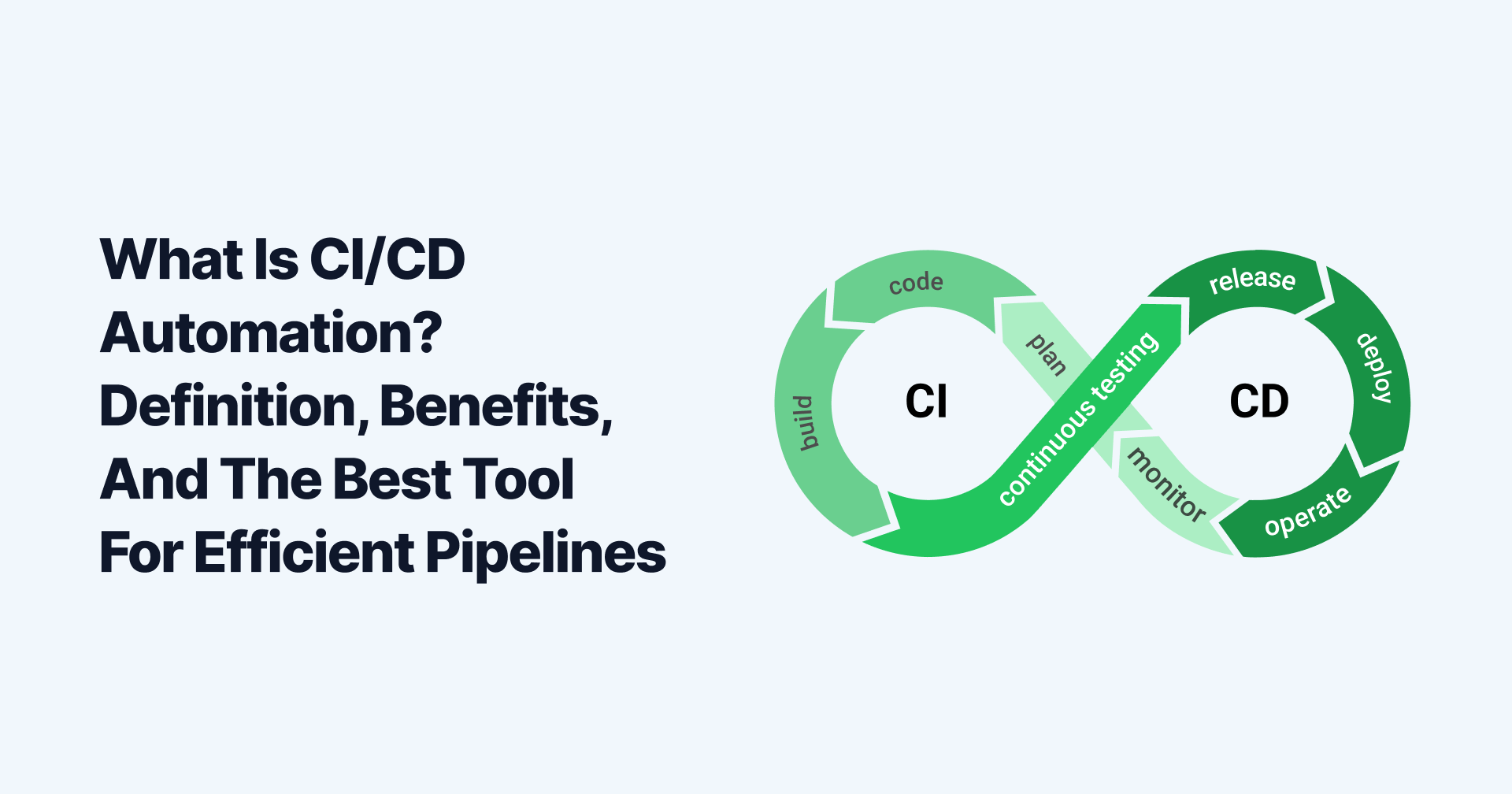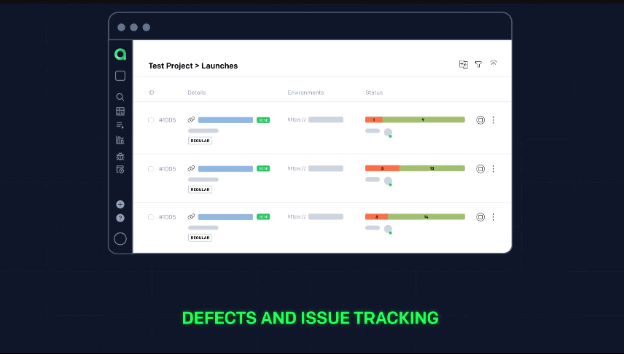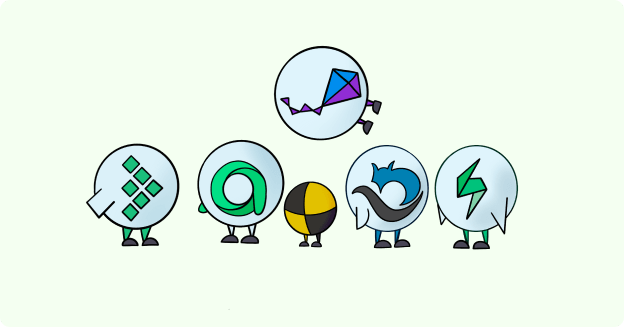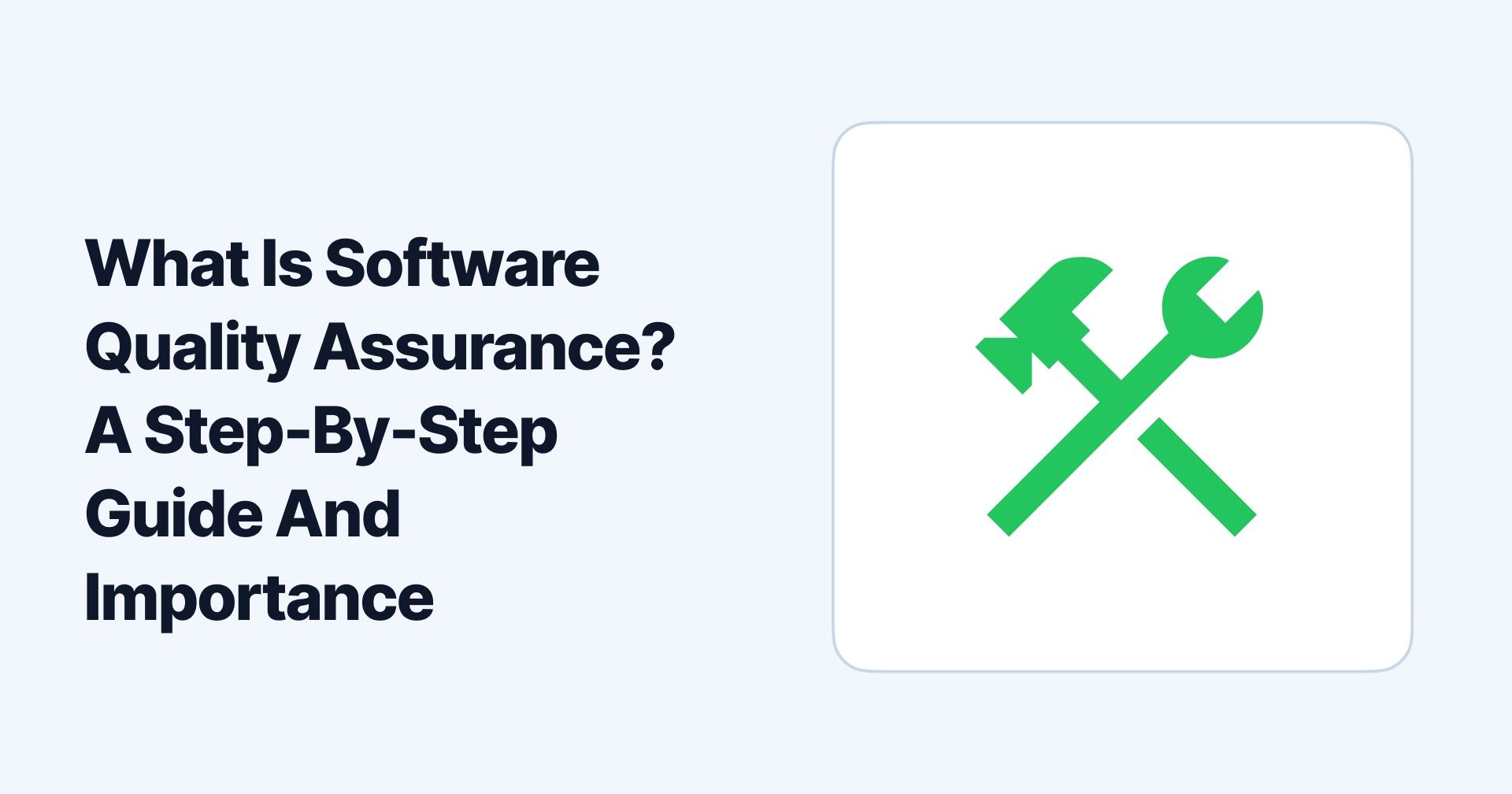
What Is CI/CD Automation? Definition, Benefits, And The Best Tool For Efficient Pipelines
Maggie Ferris
Apr 01 2023
Software development companies worldwide are investing significant resources into forming newer ways to complete their development cycles faster and reach their audience before competitors.
The CI/CD process is a promising replacement for traditional software development methods to expedite the creation of updates and features that guarantee optimal user satisfaction.
Effective CI/CD automation can remove the need for manual intervention by automating test processes for frequent feedback loops and automatic deployments into delivery-ready environments so you can launch your application updates when you are ready.
Learn more about automating CI/CD processes, their benefits, and the best tools today.
What is a CI/CD Pipeline?

CI/CD stands for continuous integration and delivery. It is a DevOps process that relies on automating various processes of the software development cycle for smaller but meaningful software deliveries to the main code branch.
The objective of CI/CD is to shorten the duration of development cycles through effective collaboration of QA and dev teams to write code guided by frequent automated testing to detect defects before changes are integrated into the main body to reduce issues in subsequent phases.
The CI/CD pipeline is thus a cycle that leverages automation to deliver updates and features for consistent user experiences.
CI/CD pipelines can be broken into two major phases. Continuous integration (CI) involves developers working on application features and code changes that are tested frequently through automated tests before being added to the codebase.
Continuous delivery automates the release of validated code to a repository to create a codebase ready to be deployed into a production environment.
Automation in CI/CD Pipelines
CI/CD automation involves automating various phases to reduce the manual intervention required for development, testing, and deployment. The shorter, iterative cycle is an agile approach to receiving constant feedback for smaller but constant releases without breaking the existing build.
CI/CD automation relies on tools and technologies like code compilation, testing, artifact generation, etc., to deliver reliable and meaningful changes to the software codebase.
Test automation further assists in acquiring rapid insights by resolving repetitive tasks consistently and without errors, which brings in the process of continuous testing (CT). Automated tests in your CI/CD pipelines provide greater test coverage in a shorter time.
Continuous Integration
Continuous integration (CI) is the first step of the CI/CD pipeline. This development process enables developers to work separately on smaller code changes daily and commit the code to the central repository after frequent testing.
After the code is updated to the central codebase, a build is triggered automatically, followed by automated unit tests to validate the functionality to individual code units. If the software build detects bugs or issues, the codebase is reverted to the previous state.
With verification from automated tests, CI servers integrate the code changes into a master codebase called the “trunk.” Dev teams making smaller but meaningful changes help optimize the CI/CD pipeline with gradual updates tested frequently before being committed.
Conducting tests that direct and define the limits of code changes can pose a significant amount of work on QA teams if done manually. Automated testing removes the hassle of repetitive work to cover a range of tests parallelly.
CI encourages frequent code changes and automated testing to guarantee high-quality updates to your software product while minimizing code conflicts amongst the changes implemented by your developers on the same application. You can work on bugs and security issues proactively.
Continuous Delivery
Continuous delivery (CD) is the process that leverages the changes made in the CI stage and pushes them into delivery environments to ensure updates to the trunk are always ready to move into the production stage.
Automated integration and regression tests in live production environments can help you verify the integrity of your software production before it reaches end-users. CD automation involves the release process, where the goal is to prepare the software product for deployment at any time.
Continuous delivery prevents last-minute problems and bugs by letting you run automated tests in a production environment.
Continuous Deployment
“CD” in the CI/CD acronym can also refer to Continuous Deployment, where code changes are released automatically to reach end-users without human intervention after it passes a series of predefined tests in a live production environment to verify code integrity.
Teams can define particular criteria for code changes and schedule automated releases once the codebase meets them in a production environment, ensuring a faster time-to-market (TTM).
Top 3 CI/CD Automation Tools
CI/CD tools automate the processes throughout the development cycle and testing phases. These tools help your teams bypass the manual task of adding verified code updates to a central repository and create a high-quality codebase ready to be deployed in production environments.
With numerous CI/CD automation tools to choose from, I have compiled a list of the 3 best CI/CD tools that will expedite your SDLC and help you release meaningful updates faster for an optimal end-user experience:
Jenkins

Jenkins is regarded as the best continuous integration tool in the industry and an essential skill for DevOps engineers to master. Jenkins is a free, open-source CI automation server for software testing and reporting on a Java-based program.
Jenkins’ community-driven platform supports 1800+ plugins, including Slack, Selenium, Jira, Redmine, Gradle, etc., with flexibility options for creating personalized plugins.
In addition to allowing smaller organizations to run central build and CI processes effortlessly, Jenkins can be used for CD to deploy code.
TeamCity

Developed by JetBrains, TeamCity is a free server-based integration and build management solution that provides features like history reports, automated failure identification, and reusable settings for sub-projects out of the box.
TeamCity maintains CI/CD automation servers with Azure DevOps, Jira Software Cloud, and .NET technologies integrations. You can run build jobs parallelly on different environments.
TeamCity offers build history and reports, launches build agents in the Kubernetes cluster and performs code coverage and deduplication.
GitLab

GitLab is a comprehensive suite of tools that enables all CI/CD pipeline processes, including continuous delivery and continuous deployment on an intuitive UI and centralized dashboard.
GitLab requires you to host your codebase on Git and gain access to integrations for all GitLab features. Smaller organizations can create integrations with open API.
At its core, GitLab is a web-based open-source Git repository manager with features like wiki, issue tracking, and analytics.
Here is a holistic view of all the CI/CD automation tools put next to each other so you can compare their features:
| CI Tools | Plugins | Supported Environments | Drawbacks | Pricing |
|---|---|---|---|---|
| Jenkins | 1800+ | Windows macOS Unix (openSUSE, Red Hat, Ubuntu) Kubernetes |
Requires constant maintenance Unintuitive UI |
Free |
| TeamCity | 400+ | Windows macOS Linux Unix (Solaris, FreeBSD, IBM z/OS, HP-UX) |
Steep learning curve Major updates require manual configuration |
14-day free trial. Free for on-premise (100 build configurations and three agents) $299 to add 1 build agent and 10 build configurations |
| GitLab | Integration with GitLab REST API to create and manage Git repositories | Windows macOS Linux distributors (Ubuntu, CentOS, Debian, Oracle Linux) |
Test failures often result in complete disruption of the pipeline Limited third-party integrations |
Free for 5 users and 400 units of computing/month $29/month per user |
Optimize Your CI/CD Pipeline with Continuous Testing
Continuous testing (CT) is a software development process that prioritizes frequent testing throughout the software development life cycle to develop high-quality products faster with constant feedback loops and bug detection that your dev teams can act on.
Incorporating CT into your CI/CD pipelines is further optimized by involving test automation frameworks that enable QA teams to write and execute tests before or during the continuous integration and delivery process.
Continuous testing moves the testing process earlier into the development phase, helping DevOps teams “shift left” so additions to the central repository can be tested for quality before major UI elements and backend APIs are implemented.
Unit and functionality tests can detect issues during the CI process, while regression tests flags when a code change fails one or more tests based on the application’s functions.
As you scale your testing processes with automation, maintain a consistent database for your test case results while automating various testing processes to deliver high-quality products for optimal customer experiences.
Allure Testops automates your test documentation in real time while offering a centralized platform where you can view performance metrics for your test cases through powerful analytics features. Our suite of integrations for programming languages can be run on any CI platform.
Allure Testops: The Best Test Automation Tool To Integrate Continuous Testing

Allure Testops is a robust test management solution that optimizes your CI/CD pipelines after integrating into them seamlessly. Your teams can unify manual and automated test cases and analyze their performance with powerful analytics features.
Integrations to Streamline Continuous Testing Strategies
Allure Testops leverages native integrations that enable you to import test cases from any source and integrate them with major CI/CD automation tools.
Our centralized platform offers integrations for programming languages and test frameworks (JUnit, TestNG, Pytest, Nose,etc.) operating on any CI system like Jenkins, Bamboo, GitLab, GitHub, CircleCI, TeamCity, etc. with job sync, test creds, and pipeline listing and starting capabilities.
View the other integrations for CI systems, issue trackers, and third party TMS offered by Allure Testops by clicking here.
Smart Test Cases

Smart Test Cases automates the test documentation process by updating test results after every run to enrich the data in your repositories. Your teams can work with accurate test data without the manual effort to maintain a single source of truth for your test cases.
We provide granular version control with the Test Cases as Code on an intuitive UI so your DevOps teams can access rapid insights on demand.
Allure Report

Allure Report is a lightweight and flexible community-driven test report platform that lets users create comprehensive visualizations to monitor key performance indicators (KPIs) and project status.
On a tree-based representation, you can gather deeper insights into particular test cases by drilling into reports for complete transparency on metrics such as success rates, flakiness, etc.
Defects and Issue Tracking

Allure Testops simplifies the analysis and processing of failed tests by automatically categorizing defects and errors encountered during test runs into predefined issue tracker buckets, thereby saving significant resources your team would have spent doing it manually.
Pricing
Allure Testops has two premium plans: Allure Testops Server and Allure Testops Cloud. Our plans are designed to cater to your exact test management requirements while offering flexibility based on your company’s technical expertise.
Allure Testops Server lets you maintain your test instances on your servers after we seamlessly integrate our services into your pipelines. The plan comes with a 30-day free trial to try our features risk-free.
| Allure Testops for 1 - 50 users | $30/month or $27/month (annual) |
|---|---|
| Next 51 - 100 users | $20/month or $18/month (annual) |
| Next 101 - 250 users | $10/month or $9/month (annual) |
| Others | $5/month or $4.5/month (annual) |
Allure Testops Cloud is our cloud platform where we host and maintain your Testops instances for companies with limited IT capabilities. You can try our cloud features with a 14-day free trial.
| Allure TestOps Cloud for 1 – 30 Users | $39/month or $35/month (annual) |
|---|---|
| Next 31 – 50 Users | $36/month or $32/month (annual) |
| Next 51 – 100 Users | $34/month or $30/month (annual) |
| Others | $30/month or $27/month (annual) |
Conclusion
Maintaining an optimized CI/CD pipeline is crucial to developing quality software products that reach your customers before competitors while ensuring a consistent end-user experience.
Automation in the continuous integration phase can provide more frequent feedback loops for individual developers working on smaller code changes before they commit to the central repository, ensuring only verified code enters the codebase to prevent defects later in the SDLC.
The CD phase being automated can help schedule the deployment of trunks into live production environments or the hands of customers after a series of automated tests verify the integrity of your software product.
To further supplement your CI/CD automation efforts, you can maintain your test documentation automatically with Allure Testops. You can monitor key metrics for test cases from a single pane of glass while utilizing a range of integrations with test frameworks on any CI system you choose.
Exercise more control over your test instances with Allure Testops Server after you try our features risk-free for 30 days, or let us maintain them on our cloud platforms with Allure Testops Cloud that you can subscribe to after a 14-day risk-free trial.
Gather rapid insights from your test cases automatically and optimize your CI/CD pipelines with native integrations with Allure Testops today!


